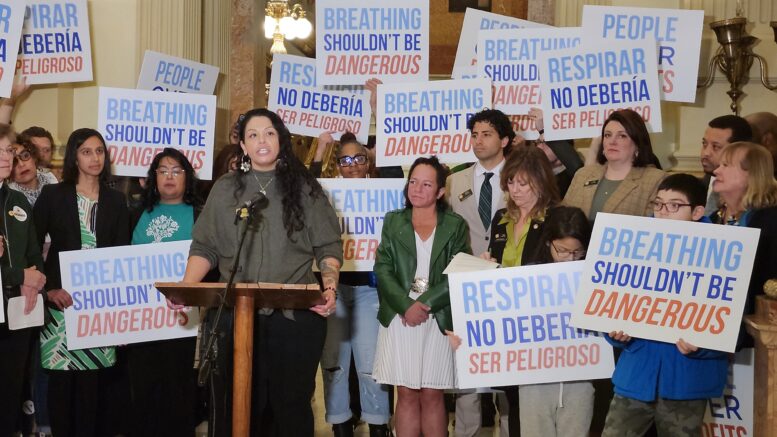The work of the interim committee on ozone pollution became manifest Thursday, as Colorado Democrats rolled out a trio of bills to ramp up regulation on emissions-producing facilities, stop summertime oil-and-gas drilling and significantly boost penalties on repeat violators.
Advocates, speaking at a Capitol news conference, said the bills are needed to force corporations to change their practices when they spew too much pollution — and to make state regulators enforce existing rules to their maximum capability. But oil-and-gas and business organizations said in a news conference later in the afternoon that the proposals, in combination with a bill introduced last week that would bar permits for new wells beginning in 2030, amount to a ban of a major state industry.
The bills, which have been in germination since the Legislative Interim Committee on Ozone Quality finished its work in December and in circulation in draft form for two weeks, aim broadly to reduce emissions in sectors ranging from transportation to energy to warehouses. But supporters made it clear that the primary targets of their proposals are oil-and-gas drillers and Suncor Energy, which operates the state’s only refinery in Commerce City.
“Despite the oil and gas industry being the largest driver of air pollution, the state continues to give permits for more pollution,” said Rashad Younger, second vice president of the Rocky Mountain NAACP State Conference. “Overzealous CEOs do not know about our pain or care about our pain.”
“Seek to end the … industry”
Industry leaders pushed back against that assertion, with Dan Haley, president/CEO of the Colorado Oil & Gas Association, citing state data that pegs the sector’s contributions to ozone levels in the U.S. Environmental Protection Agency-designated ozone nonattainment area as between 3% and 7%. And they accused narrowly focused special-interest groups of pushing efforts that would raise energy prices and cost tens of thousands of state residents their jobs even as the industry already is lowering its emissions intensity.
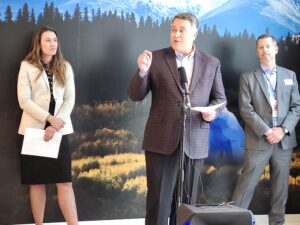
Colorado Oil & Gas Association President/CEO Dan Haley speaks at a news conference Thursday about a slate of new environmental bills.
“This proposed package of legislation pays no mind to the work of Colorado regulators, stakeholders and every-day residents,” Haley said. “These bills seek to end the Colorado oil and gas industry and upend a $48 billion industry without regard to the lives of those who depend on it.”
Senate Bill 165, sponsored by Democratic Sens. Kevin Priola of Henderson and Lisa Cutter of Morrison, targets air-quality improvements via new restrictions on off-road diesel-fueled fleets, indirect sources like warehouses and miles driven by Front Range residents. It also would ban oil-and-gas drilling work between May 1 and Sept. 30 and would put into law Gov. Jared Polis’ 2023 executive order for energy firms to reduce nitrous oxide emissions 50% by 2030, though sponsors nixed a provision from a draft bill that would have banned the sale of new gas-powered vehicles beginning in 2035.
SB 166, sponsored by Sen. Faith Winter, D-Broomfield, takes aim both at high-emitting companies and at the state regulators accused by bill backers of not enforcing rules and penalties against polluters. It creates new categories of “repeat violators” (five or more violations of air-quality laws within three years) and “high-priority repeat violators” (five or more exceedances of allowable emissions levels for air pollutants in three years) and mandates penalties on them that are no less than 50% of the maximum allowable penalty.
New mandates for regulators to fine emissions violators
The bill also raises the maximum civil penalty for air-quality violations and requires high-priority repeat violators to submit root-cause analyses of their violations and then be subject to a reduced cap on their allowable emissions — all while making revenue from civil penalties exempt from the state’s Taxpayer’s Bill of Rights limits. And it allows individuals to bring civil actions against alleged violators, while directing courts to award plaintiffs any costs they incurred in bringing the lawsuits if the award is appropriate.
Rep. Meg Froelich, the Greenwood Village Democrat who is cosponsoring SB 166 in her chamber, emphasized that the bill requires state agencies to impose fines large enough that they will change polluters’ behavior. She and other supporters on Thursday criticized those agencies for administering penalties they consider to be too light, for requiring Suncor to spend most of its fines on improving its plant and for allowing agencies to continue to grant permits to repeat violators.
“Too frequently, those who have been charged with enforcing regulations don’t use their full power to hold those polluters accountable again and again and again,” Froelich said.
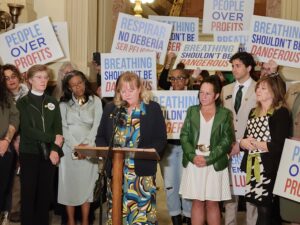
Colorado state Rep. Meg Froelich speaks at a news conference at the Capitol on Thursday.
Restrictions on new permits, wells
The third new bill — House Bill 1330, sponsored by Democratic Reps. Jennifer Bacon of Denver and Jenny Willford of Northglenn — would require state regulators to aggregate expected emissions from multiple wells when considering permit applications for them. It would require more modeling from air-quality permit applicants and would bar new permits for applicants in the nonattainment area unless they cut existing emissions equal to the amount of new emissions they will produce and are not located within a disproportionately impacted community.
“It’s not too late to force those who have caused harm to be held accountable,” Commerce City Councilwoman Renée Chacon said. “I want the ozone bills to not be the end of this but the beginning of future legislation that our community needs.”
All of these are in addition to SB 159, which Priola and Democratic Sen. Sonya Jaquez Lewis of Longmont introduced on Feb. 13. That bill would limit the number of drilling permits issued in 2028 and 2029, bar the state from issuing any more such permits beginning in 2030 and requiring drilling to begin at all permitted site by 2032.
No “reasonable solutions”
With wells being most productive in their first 18 months of operation, that would send the oil-and-gas industry into a death spiral beginning in 2034 and unravel many of the 300,000 jobs the industry supports, sector leaders have said previously. But industry observers have said the new bills could create a host of other issues as well.
If all violations, including administrative ones, could stack up against companies as SB 166 proposes, one industry leader said, that would create an incentive for companies to fight all the violations they now agree to, tying up regulatory agencies in endless hearings. It also would serve as a disincentive to companies doing self-audits in which they find, report and quickly fix violations without significant repercussions, as multiple violations could now prove punitive.
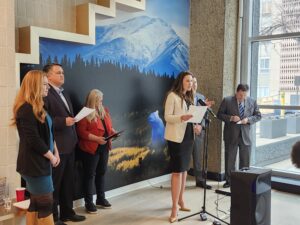
Kait Schwartz, director of American Petroleum Institute Colorado, speaks about a slate of new environmental bills at a news conference Thursday.
The summertime drilling ban proposed in SB 165 has exemptions for electric drilling equipment, but it would be difficult to convince most companies to invest in such pricey equipment if they would be banned from drilling new wells in just a few years, Haley said. And while the bills could severely curtail activity in a state that is fourth nationally for crude-oil production and eighth for natural-gas extraction, they likely would do nothing to curtail demand, meaning that oil and gas would have to be transported into Colorado from other states or countries instead, they added.
“None of them contemplate reasonable solutions,” said Kait Schwartz, director of American Petroleum Institute Colorado about the slate of bills. “None of them resemble the conversations we had at the interim ozone committee.”
Emissions reducers or “job killers”?
Among those conversations was acknowledgement in a study conducted for the state by RMI consulting that oil and gas firms already have exceed 2030 goals for emissions cuts by 10% while sectors like buildings and transportation are less than 70% of the way there. Colorado Chamber of Commerce President/CEO Loren Furman on Thursday labeled the slate of bills as “job killers” and said they “put the livelihoods of Coloradans at risk.”
It remains unknown whether any of the bills can garner support from Polis, who neither attended Thursday’s news conference nor was mentioned by any of the speakers, even as the enforcement of laws by his regulators drew criticism.
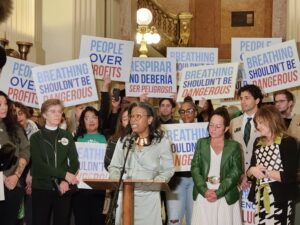
Colorado state Rep. Jennifer Bacon speaks about a new slate of environmental bills on Thursday at the Capitol.
But Bacon said the sponsors are not going to bow to criticism at a time when the state too frequently issues ozone alerts that particularly affect industry-adjacent neighborhoods like those she represents in northeast Denver. The general idea of the package is that future drilling sites, refinery expansions and new facilities cannot continue adding more emissions to the already polluted air, she said.
“We did not come here to be the maintenance system. We came here to be the system changer,” Bacon said. “If you cannot demonstrate that you can operate within an amount that will not contribute further (emissions) … then you should not do it.”
